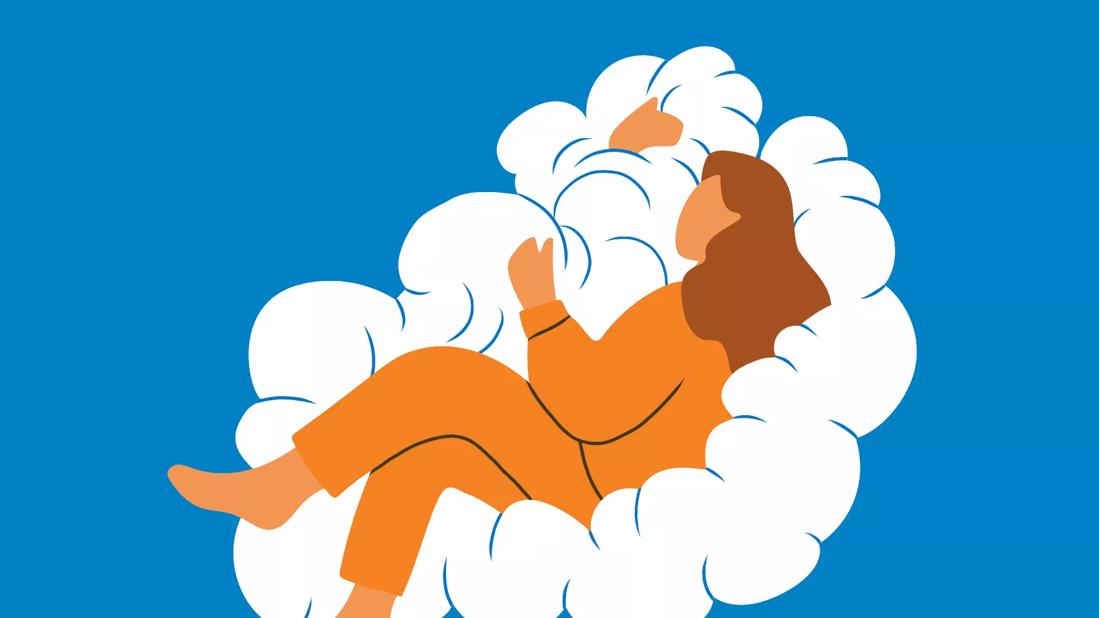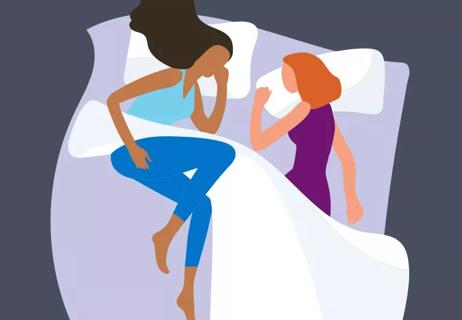Sleep-sex episodes are rare sleep-related disorders

You’ve heard of talking in your sleep and walking in your sleep. But what about having sex in your sleep? Can that actually happen?
Advertisement
Cleveland Clinic is a non-profit academic medical center. Advertising on our site helps support our mission. We do not endorse non-Cleveland Clinic products or services. Policy
Sexsomnia is a type of sleep disorder known as a parasomnia. You may experience sensations and behaviors while asleep, falling asleep or even waking up with parasomnias. When it comes to sexsomnia, you may engage in masturbation or even engage in sex with others.
Sleep specialist and neurologist Marri Horvat, MD, MS, explains this rare sleep disorder and what to do if you think you have sexsomnia.
Also known as sleep sex, sexsomnia is when you engage in sexual activity when you’re asleep. And it’s quite likely you don’t know you’re doing it.
In rare cases, some people exhibit sexual behaviors during a deep sleep and have no memory of it, says Dr. Horvat.
“In sexsomnia, the sexual behavior can be outside your normal behavior or it can be your normal sexual behavior,” she explains. “But you’re unaware it’s occurring, and it’s unintentional.”
Like sleepwalking, sexsomnia is a parasomnia, a sleep-related disorder that occurs when you’re in between deep, dreamless sleep and wakefulness.
Behaviors during an episode may include fondling, masturbation, sexual intercourse, pelvic thrusting and spontaneous orgasm.
Although you’re asleep, it can appear to others that you’re awake. Someone experiencing an episode might have an open-eyed, vacant look, Dr. Horvat says.
Advertisement
And you may only find out you have the disorder from a partner, roommate or family member.
If someone around you witnesses this unusual behavior, ask them to write down what they observed. Even though it’s embarrassing, their observations can help your doctor diagnose and treat your condition.
Sexsomnia is extremely rare, appearing most frequently in those who have another sleep disorder like sleepwalking.
A study published in the American Academy of Sleep Medicine found that men are three times more likely than women to exhibit sexsomnia symptoms. Behaviors in men are likely more pronounced, perhaps more aggressive. Women are more likely to masturbate.
Other conditions that disrupt deep sleep can also lead to sexsomnia. Heartburn, restless leg syndrome and sleep apnea can all put someone in a sleep-wake state where these sleep-sex behaviors might appear.
Additionally, epilepsy, head injuries, migraines, Crohn’s disease and colitis are also associated with sexsomnia.
Although the reasons behind sexsomnia episodes aren’t clearly understood, many things can trigger them, Dr. Horvat says.
“The obvious triggers are anything that wakes you up,” she says. “Just like making noises, touching or turning on lights can cause someone to sleepwalk when they’re in a deep sleep, you can trigger sexsomnia.”
There’s evidence that drinking alcohol or using recreational drugs may lead to an episode for those who have the disorder.
In many cases, however, the triggers are factors that are more difficult to control, including:
It’s possible to manage the disorder by addressing underlying conditions that disrupt sleep, Dr. Horvat notes.
“For treatment, you must avoid any external stimulation that could trigger sexsomnia,” she says. “Both internal and external things that make you uncomfortable or half wake you up can trigger episodes, so you should avoid them.”
Other treatments may include:
But the real key, stresses Dr. Horvat, is to make sure you get enough sleep and maintain healthy sleep hygiene habits.
The first step in managing sexsomnia is to get a diagnosis, followed by the appropriate treatment. Speaking to a doctor about these episodes is important.
Advertisement
Because you’re not in control of your actions during episodes of sexsomnia, your condition may put others at risk.
Though you may feel shame about having sexsomnia, talking with your loved ones about it can help them understand and feel safe. Counseling, for you and those affected, may be an option.
While you figure out the best treatment, there are a few things you can do to keep you and others safe:
“It’s important to take precautions while you seek treatment to limit any triggers to these events, to help you and those you love sleep safely,” says Dr. Horvat.
Advertisement
Learn more about our editorial process.
Advertisement

Arousal without orgasm can be uncomfortable, but it’s no reason to pressure sexual interactions

Some foods are thought to rev up your sex drive, despite lack of scientific evidence

If anxiety is keeping you from having the sex life you want, communication, education and therapy can help

Anorgasmia is a fairly common concern with a wide range of physical and psychological causes

Your sexual history directly influences your physical, mental and emotional health in a multitude of ways

‘Safer sex’ means STI prevention, avoiding unintended pregnancies and psychologically safe practices for everyone

Medications and therapy can help get your groove back

It’s perfectly normal for gas pockets to ‘evacuate’ during the motions of sex

Wearing a scarf, adjusting your outdoor activities and following your asthma treatment plan can help limit breathing problems

Your diet in the weeks, days and hours ahead of your race can power you to the finish line

When someone guilt trips you, they’re using emotionally manipulative behavior to try to get you to act a certain way